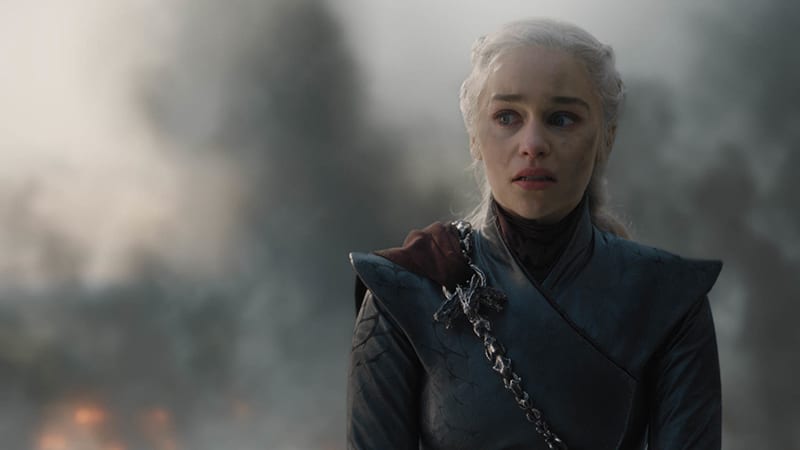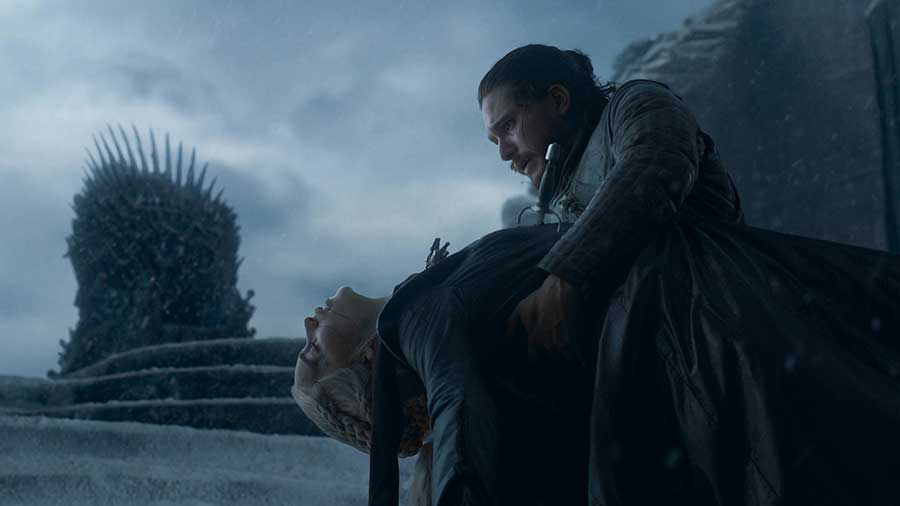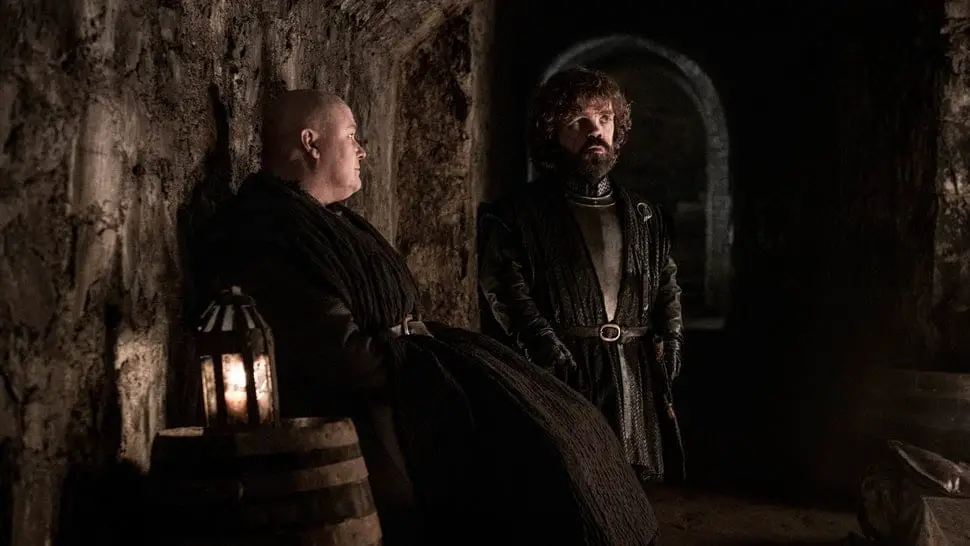A couple weeks have now passed since the series finale of Game of Thrones. To say it’s been controversial is…an understatement. A tongue-in-cheek petition criticizing the writing passed 1.5 million signatures. The online anti-D&D (for David Benioff and Dan Weiss, showrunners of Thrones) memes have hit a peak. Actors have offered the full spectrum of responses to the criticism, with every one of their various interviews and behind-the scenes analyzed down to the slightest facial twitch for signs of displeasure.
(Some have been more obvious than others.)
As longtime critics of Game of Thrones, we here at The Fandomentals have certainly felt some satisfaction in the backlash. Now that it’s over, though, it’s back to the analysis.
One of the biggest criticisms of the final season had to do with Cersei and her place as the follow-up villain to the White Walkers, whose quick end took many by surprise. The quick end of the Night King instantly created debate among fans of A Song of Ice and Fire about whether the show entirely missed the point of the series by ending the supernatural threat early. Wasn’t the whole point of the series to show how the political squabbling was pointless compared to the larger threat of the Others? Why would D&D do this? Did George RR Martin plan to do the same thing?

Personally, I think Martin has planned for this scenario. I not only think this post-Others political conflict was always the plan, but also that the Others will be fuel for a political conflict as well. I don’t see a problem in Game of Thrones ending on this conflict instead of the ice zombies. Rather, the problem exists for one huge reason, a reason obliterating one of the pillars upon which Martin will likely make this ending conflict exist in his books.
Game of Thrones cut Aegon Targaryen, and that’s where they missed the point. And no, I don’t mean Jon “Aegon” Snow.
I can’t imagine many people reading this don’t know who Aegon from the book is. Quick recap; in A Dance With Dragons, we meet a 16-year old boy named Young Griff who is eventually revealed to be the son of Rhaegar long thought dead when the Lannisters sacked King’s Landing and Mad King Aerys died. There are very serious questions about his identity but we’re going to ignore this (mostly) and focus on why cutting him proved such a mistake.
In the books, Aegon has landed in Westeros and begun a campaign to take the Iron Throne. He will almost certainly succeed if foreshadowing and Martin’s previous comments hold true. He has outright said a second Dance of Dragons will take place. Dany has a vision in the House of the Undying about the people praising a “cloth dragon,” suggesting Aegon and his real identity. Since he doesn’t exist in Game of Thrones, I’m operating off the assumption that Cersei was given his role instead.
It makes sense. Cersei teams up with Euron, and in the books Euron is attacking the Reach at about the same time Aegon will. This will likely involve the destruction of the Tyrells, which Cersei’s forces are responsible for in the show. She hires the Golden Company, who make up the majority of Aegon’s forces. Cersei’s opposition to Dany fulfills the second Dance of Dragons comment Martin made.
Needless to say—or at least I hope so—Cersei simply did not work as an antagonist to Dany. When Dany arrives, Cersei has no support outside of King’s Landing. The Reach, Dorne, and the Iron Islands are all against her. The North is no ally. The riverlands have been wasted. Dany arrives with an overwhelming force Cersei has no chance to stop. Game of Thrones twisted its narrative absurdly out of shape to make her a viable antagonist. Seasons 7 and 8 both suffered from the writing’s terrible attempts to make her any real threat. There was no plausible reason for Dany to not just attack King’s Landing and end things.
A big reason why people couldn’t buy Cersei as the “final boss” after the Others was because they couldn’t take her seriously as any real threat. We saw this in action when Dany finally attacked and laid waste to Cersei’s army with Drogon alone.
Things are already vastly different in the books. Aegon is about to take Storm’s End and Arianne Martell is on her way to likely form a Dornish alliance. His allies talk about “friends in the Reach” who will turn against the Tyrells, suggesting Aegon may get this region on his side as well. Randyll Tarly’s shift to Cersei’s side likely represents this. By the time he presumably reaches King’s Landing and a leaderless Lannister army, he will probably have the southern half of Westeros on his side.
Dany not simply laying waste to King’s Landing makes much more sense with a powerful, beloved Targaryen with significant support already sitting the Iron Throne when she arrives. She will have valid reasons to treat with the current monarch that don’t exist than with an alienated Cersei Lannister sitting the throne. Everything we saw take place on Game of Thrones suddenly makes more sense.
More than this obvious narrative fix, though, Aegon and his support will almost certainly serve a very important function to Dany’s character, and the events we saw in season 8.

To be clear, I don’t think it’s any certainty that Daenerys Targaryen becomes a villain. There’s a part of me that worries about the sexist implications, even if it’s executed with more skill than D&D used. However, I do think Dany will do something causing her eventual demise at Jon’s hands. We may not know how King’s Landing burns and Dany ends up dead at Jon’s hands, but I do believe these plot points both came from George RR Martin. And they would both make much more sense with Aegon sitting the throne instead of Cersei.
In the books, Aegon is presented to us as the savior of Westeros, the good, rightful heir coming to restore the order lost ever since Robert Baratheon took their throne. Clearly this is far from the truth, especially since Varys is responsible for much of said lost order, as part of the plot to seat Aegon. However, Aegon comes to Westeros as this savior and will almost certainly succeed.
On Game of Thrones, Daenerys is this savior. She comes to Westeros at the head of a Westerosi army. She faces a tyrant who has just blown up the Song of Ice and Fire equivalent of the Vatican. Cersei Lannister has no claim, little support, and no real chance to win. Dany comes to right the lost order of the Seven Kingdoms.
When Jon’s heritage creates a tension leading Dany to feel isolated and unloved, it simply does not make the least bit of sense. Game of Thrones wants us to think that the presence of one Targaryen who swears unbreakable allegiance to her poses enough of a threat to send Dany down her dark path. It asks us to simply forget just how much of Westeros supports Dany. Most of all, it conflates Jon’s love with that of all of Westeros in a way that was frankly sexist and offensive. In the end, Dany turns villain because a man won’t love her.
This plot point totally overlooks what another Targaryen would mean to Dany. This girl has spent her life alone, with no real family. Viserys abused her. She has nothing but fantasies about her brother Rhaegar and cruel stories about her father. Her thoughts about another Targaryen entering her life would never boil down to worries about the threat he poses to her reign. I won’t pretend the thought would never enter her mind, but it would not be her immediate, chief concern. She would finally have family.
With Aegon in Cersei’s place, this narrative falls into place. Aegon has significant support from much of Westeros. He is another Targaryen resisting Dany. When she comes home to find family already sitting the Iron Throne, and family that does not want to give power to her, it naturally creates the tension Game of Thrones tried and failed to create between Jon and Dany. When Jon’s heritage also becomes know, Dany’s suspicion of him will have a more understandable justification.
After all, Aegon’s entire reasoning for crossing to Westeros occurs because of Dany, and the idea of not giving power to her. The plan involved him waiting in Essos for Dany so they could cross together. He crosses early because he wants equal power to treat with her. He most likely will not be reasonable in negotiating with Dany. Take into consideration how Dany will think he is fake, and you have the kind of disillusionment that will make her distrust of Jon suddenly make sense, too.
By the time any presumed attack on King’s Landing happens, Dany would be in position to take the city brutally or do something causing the hate and fear which leads to her death. Aegon and Jon will both have more support. Dany will be the invader at the head of a foreign army of Dothraki and Unsullied. She may feel the need to make a statement of power and fear.
Burning King’s Landing may be that statement.
You also have to consider the characters around Dany, like Varys or Tyrion, who suffered from the lack of Aegon. Varys’s entire character depends on Aegon existing. His plan from the beginning of the series aims at placing Aegon on the throne. Without him, Varys’s actions in the early seasons make no sense. He also had nothing to do in the later seasons. Among the many wasted characters on Game of Thrones, Varys ranks quite high.
Tyrion has less involvement with Aegon, but a sizable portion of his story in A Dance With Dragons involves Aegon. He’s even the one who encourages the early invasion of Westeros. Without Aegon he spends too much of seasons 5 and 6 wasted. Also, what sounds better for seasons 7 and 8: Varys and Tyrion on the same side, repeating conversations, or them dueling when Dany and Aegon stand in opposition to each other?

But Aegon’s exclusion hurts beyond the impact on Dany and this turn she takes in the final season, or the impact on any other characters. It has everything to do with the point of his existence and the tropes at play between Dany, Jon, and Aegon. It has to do with the very story Martin is likely telling.
Each of these three lost Targaryens represents a different telling of the Lost Prince trope. There’s a reason Martin went in that direction with his story. And most of all, there’s a reason he waited so long to reveal Aegon, while making both Dany and Jon main point-of-view characters from the very beginning.
In many ways, Aegon represents the usual good guy of the story. Putting aside the very reasonable doubts about him being the real Aegon, he has the best claim by far between the three. He is the trueborn son of Rhaegar, the dead prince. He comes to Westeros with an army of exiled Westerosi soldiers. Varys talks about raising him to rule well. Aegon Targaryen is a good, true king come to take back his throne, or would be in any other story. Westeros will celebrate him as exactly that kind of hero.
In comparison, Dany somewhat represents the barbaric foreign invader. Her army consists of the stereotypical “savages” in fantasy and she has the deadly dragons the heroes usually slay. Jon is the gruff, bastard “northerner” with no real claim who also represents a less civilized society, one without the chivalry, knights, and songs of the lands south of the Neck. At the same time these tropes exist to make him the honorable prince who would have no interest in ruling and therefore be the best candidate.
In the types of fantasy Martin sought to challenge with ASOIAF, one or both of these characters would show up as an antagonist to the Aegon of the story. Instead Martin follows them from the beginning and establishes them as the heroes. He challenges the tropes Dany and Jon represent and makes us care and cheer. When Aegon arrives, he instead serves as the villain because we don’t know him. We know Jon and Dany, and for the most part we like them. We see them earn their place in the story. With Aegon we are only told.
As Tumblr-blogger turtle-paced puts it, Aegon forces the readers to think on all three Targaryens and question them.
Add in the, in my humble opinion, very low chance that Aegon is actually Aegon, and you have a fascinating bit of characterization that challenges tropes and the characters involved. The presence of all three “Targaryens” is at the heart of what George RR Martin wants to do with Jon and Dany’s story. Aegon’s inclusion lies at the core of the challenges he set out to make towards traditional fantasy stories.
Cersei Lannister offered absolutely none of this. She’s nothing more than another Westerosi obstacle to be easily cast aside by a unified Targaryen team. Dany has no “mummer’s dragon” she was warned against. This dragon does not sit the Throne when she comes home. Most of the reasons why she would do anything brutal to King’s Landing do not exist. A Song of Ice and Fire is no longer on screen. Instead we have something entirely different and far less compelling.
And yet we watch for two seasons as Game of Thrones hands Cersei incomprehensible victories in desperate attempt to justify her. All they needed to do was include Aegon instead.
I could be very wrong about all this. Perhaps Aegon dies before he gets the Iron Throne. Maybe I’ve completely misinterpreted why Aegon exists and what Martin meant to do with Jon and Dany. It’s also very likely that whatever Martin originally planned, those plans are fluid and changing with every day he spends writing.
That doesn’t change that Aegon better serves the story Game of Thrones told than Cersei Lannister did. Even if Martin’s plans change, clearly D&D told a story based on a plan Martin once held to and dependent on Aegon. It was a huge mistake to cut him, one that damned Game of Thrones from the very second they made the decision.
I can’t think of many better examples of how fundamentally D&D misinterpreted Martin’s story.

